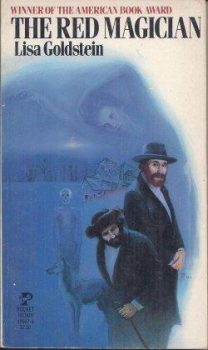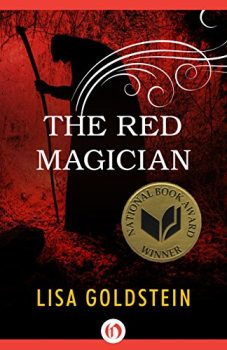The Red Magician by Lisa Goldstein
I
n the town where Kicsi grew up there was a rabbi who could work miracles. It was a small town, and borders — Hungarian, Czech, Russian — ebbed and flowed around it like tides. Once, Kicsi remembered, she went too far from home and came to a place where the people spoke a different language. In the distance, on the horizon, stood the mountains, fat and placid as cows.
The Red Magician (1982) by Lisa Goldstein is a young adult, magical realist novel about a Jewish girl, during, and after the Holocaust. The author, herself the daughter of two Holocaust survivors, won a National Book Award for paperback original. The book, while short by today’s dreadful standards, is a compelling meditation on willful blindness in the face of great horror, misplaced vengeance, and the harrowing effects of survivor’s guilt.
Kicsi, which means little in Hungarian, lives with her family in a small town completely isolated from the evil smothering much of Europe. We meet her as she listens in on a conversation between her father, Imre, and the town’s rabbi. The rabbi threatens anyone who doesn’t remove their child from the town school with a curse. The school, in defiance of traditional belief, teaches Hebrew. The language, the rabbi insists:
will be spoken only when the Messiah comes and we return to the Holy Land. That is to say, when God wills it. Until then Hebrew is to be spoken only in prayer.
As punishment, the rabbi curses anyone connected to the school to be tormented by forty demons for forty days and nights. Imre insists that he isn’t scared of any curse and that his daughters will continue to attend the school Fortunately, a stranger arrives in the town, first appearing in the synagogue on Friday night.
Tall, with red hair and beard, and dressed in clothes that clearly mark him as a stranger, he tells Kicsi his name is Vörös (which means red, as redhead, in Hungarian). The first intimation of the doom that will inevitably sweep away the town occurs when Vörös tells Imre that he’s most recently from Czechoslovakia.
“Ah,” said Imre. “Czechoslovakia. When this town was part of Czechoslovakia, those were better times. The freedom –”
“You wouldn’t recognize Czechoslovakia now,” said the stranger. “The freedom is gone now — the Germans have seen to that.”
He goes on to tell Imre it would be best for him to take his family and leave for America. He quickly changes the subject, though, to other matters.
 Conflict arises Vörös breaks the rabbi’s curse, driving off a supernatural power that attacks one of Imre’s employees. He provokes the rabbi’s anger when, during the rabbi’s daughter’s wedding, he tells a distraught woman that her son in Germany is dead and that all the townspeople should flee to America, England, or Palestine. The rabbi is enraged and insists there is nothing to fear and no one needs to leave the town.
Conflict arises Vörös breaks the rabbi’s curse, driving off a supernatural power that attacks one of Imre’s employees. He provokes the rabbi’s anger when, during the rabbi’s daughter’s wedding, he tells a distraught woman that her son in Germany is dead and that all the townspeople should flee to America, England, or Palestine. The rabbi is enraged and insists there is nothing to fear and no one needs to leave the town.
His warnings dismissed, Vörös takes a desperate measure to protect the town — he attempts to make a golem. Unfortunately, the rabbi’s magic proves more powerful. The golem is destroyed and the red-haired magician is driven away. When the time comes, as it inevitably does, the Jews of the town are forced to leave their homes and board trains into a devouring darkness.
Despite the book’s title, it is Kicsi who is the center of the story. She is eleven at the start and is enamored of Vörös and his stories of the world beyond her town and magic. Perhaps because of her friendship with him, she develops a premonitory sense, dreaming of the man who will one day come and take her and everyone away to their deaths.
Goldstein shows us Kicsi falling for a young man from another town and her youthful hope to see him again when he leaves for college. We also feel her despair when she realizes he is dead.
The world folded over like paper, and the other side was blank, was empty. She sank gratefully into that emptiness, and for a long time she knew no more.
After Kicsi and her family and neighbors are forced to leave their town, she eventually finds herself in a camp kitchen. By then she has been broken, by hunger and understanding just what is happening when someone asks a guard what happened to the women who’d been separated out from their group.
“Them?” he said. “They came in through the doors, but they’ll go out through the furnaces.” He studied the small group of women. “Just as you will. Just as you will.”
Kicsi does survive, though when her camp is liberated by the British she is nearly dead from typhus. Only the timely intervention of Vörös keeps her alive, but life is not something she wants anymore. She is crushed by her feelings of unworthiness to have lived when so many others did not. To get her to live, her protector must somehow convince her to see value in her survival. There are beautiful moments in this section that shine out fiercely against a sea of bleakness.
Keeping Kicsi alive is only one of the things Vörös must face. The rabbi’s hatred of the other magician has only been stoked over the years. He has come to believe the same bad luck brought down on his daughter at her wedding by Vörös led to her death at the hands of the Germans and for that, the red-haired stranger must pay. With ghosts doing his bidding, the rabbi begins a hunt across war-ravaged Central Europe for the man he believes is the source of all his anguish.
“These are the unavenged dead,” said the rabbi. “They have been killed in wars or in pogroms. Some have been killed so long ago that only they remember the name of their oppressor. They came to the town fortelling catastrophe and I bound them to me. They will do as I say now. If I tell them to avenge themselves on you, they will.”
Vörös nodded. “Then they are very much like you, rabbi,” he said. “You want your revenge, and because there is no one else, you will avenge yourself on me.” “No,” said the rabbi. “Because you killed my daughter.”
“I did not kill your daughter, rabbi.”
“You did. Just as surely as if you sent her to the furnaces yourself.
I first read The Red Magician twenty-five years ago. I thought I remembered the book, but I was startled that I remembered nothing. It is not the fantasy of survival in the face of the Holocaust that I somehow thought it was. Kicsi survives, true, but it’s not by the means of magic, but by luck. Instead, much of the story turns on the inability of people to see the evil encroaching on them. In his struggle with Vörös, the rabbi stands in for the social forces that keep the townspeople from being able to imagine an evil as great as the Nazis. I did not remember the Kicsi’s agonizing ordeal on the trains and in the camp. I definitely did not remember her unwillingness to live. This was a book that left me much more drained that I expected it to when I picked it back up a last week.
The Red Magician is Goldstein’s first book. Part of what she wanted to do was draw on the folklore of her own Hungarian Jewish background instead of the borrowed Celtic fantasies she’d been trying to write. I called it a young adult book earlier, but, really, it only has a teenage protagonist. It is an emotionally mature and complex novel that will leave an adult as affected as a teenager who reads it.
Fletcher Vredenburgh writes a column the first Friday of the month at Black Gate, mostly about older books he hasn’t read before. He also posts at his own site, Stuff I Like when his muse hits him.

Thanks for the interesting review, Fletcher. I’d never heard of this book, and I must say it sounds like a very tough read. (To be honest, even the gloss of the story’s events in your review was tough to read.) But also a powerful one, with an important message to impart. A worthy reading experience all told, and one which I will seek out.
This one has been on my shelf for many years, and this review prompted me to move it into my summer reading pile. I just finished it and would rate it as a decent try (as you point out, it is a first novel), with defects and virtues fairly evenly balanced. You can always feel Goldstein’s seriousness and earnestness, but the book is a bit of a jumble, with a lot of things not connected or fully fleshed out. I didn’t think it came close to living up to its ambitions or doing justice to its theme – but, of course, given its subject, what book could? All things considered, there was still enough there to make me want to sample some of Goldstein’s more mature work.